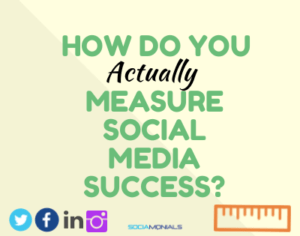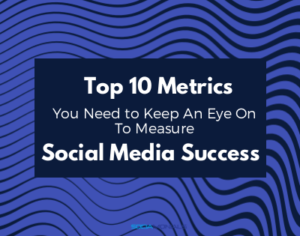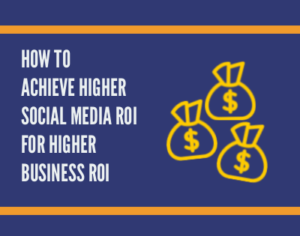

Social media success allows you to impact more people through your e-commerce business. Whether it means more fans, followers or sales, you know you’re successful in social media when more people follow you and get engaged with your content. When you’re able to get the attention of an online crowd and they do what you ask them to, and they’re all happy about it, then you know you have an effective social media strategy.

Your business can only grow to the extent that your social media success grows. With the e-commerce products that you sell, you need to first find a select group of people who are already looking for those very products. In short, the old business adage of finding a need and filling that space, is still what works today even in the social media age. When you found this group of people with a need, designing social media campaigns around that need can easily spur their interest and motivate them to take action. As a result, social media success follows.

Depending on the social media channels that you’re active on, there are different metrics that you can track to evaluate whether you’re doing well or not with social marketing. Understanding your social ROI can provide you with intelligent data that will help you take smart actions about your social media marketing.
Before you do that, it’s important that you benchmark first where you are right now. You need to know your starting point.
How many Facebook[3] fans do you have?
How many Twitter followers do you have?
How many LinkedIn followers do you have?
Since these metrics don’t directly equate to business ROI, we monitor them closely, but note that they’re not the actual indicators that will help us determine whether your online business is succeeding at social media marketing or not.
Instead, we give you 10 metrics that you can take stock of to verify the impact of your social media efforts. You’ll be able to tell that your social campaigns are effective through them.
These 10 directly affect your business ROI. As you look over your social media success, you can compare whether they increase, decrease or remain the same. You should always set a goal of improving each metric for your business, by implementing social media strategies that work.
As a recap, remember that:
Social Media Success = Increasing Metric Count = Higher Business ROI

Is there a boost in the number of visitors that go to your e-commerce site? Do your social media strategies receive enough attention that people click on the links you include in your post? If your site doesn’t receive any increase in its monthly visits, maybe you’re doing your social marketing ineffectively. You need to change something. But first, you need to find out what it is. Through social media marketing software, you can easily answer this question. When you use Sociamonials, for example, it can show you the social ROI that you’re getting from your Facebook, Twitter or LinkedIn campaigns. Then you’ll know what to do next.
How many leads do you have now compared to a month ago? Any improvement? Effective social posts can compel your audience to sign-up for your offers, especially if it’s free. If you’re not getting new leads, get back to your social campaigns. Also, sift through your landing page. Do you post targeted messages? Do you ask your visitors to do only one thing, which is to sign-up? Or, are you confusing them by telling them to click on links or buy your items or download your report? Again, if you use a social ROI automation software, you will know which part of your campaign to fix so you can improve the number of your leads.
Search engines reward websites with high social mentions. Does that describe your site? As you work consistently on your various social marketing efforts, the search engines will pick that up and give you higher ranking in the SERPS. As your site’s rank gets promoted, more people can find out about your online business. That’s one big benefit of having active and effective social media campaigns, not only that people begin to talk about you, but they also quickly find your brand as they search the net.
Your social campaigns will naturally stir up your audience interaction with your brand. Engaged customers typically recommend the brands that they like, trust and respect. It means that there are higher chances for them to purchase and become loyal customers. If your social campaigns are bringing you the right audience, it’s a proof that you’ve captured their interest. Whether it’s a comment on your posts, response to whatever call to action you ask them, review for your products, these are signs that you’ve attracted their attention and your social media campaigns are working.
Because you put out social campaigns that matter to your online tribe, you’ve established authority and gained their trust, it then converts to more sales. Remember, your prospects are looking for a solution online, when they got hold of your social content. Your sales prove that they believed in the solution that you offer. Sales is one measure that shows your social media success, as your followers trusted your advice.
If your sales aren’t growing, check how you implement your content delivery, how you show your authority in your niche, as you design your social media strategies. Through Sociamonials robust social publishing feature, you can base the timing of your social posts on when purchases and lead conversions are highest.
Are you profiting from your business because of your organic (non-paid) social media marketing? Are you not? What social ROI are you getting? If your business profits look stale, you may not have positioned your online business uniquely in a way that customers and their referrals keep on coming. Referral marketing softwares can easily and quickly help you set up referral programs, so that you can continuously get FREE new customers through your existing customers. When you create social media campaigns about your referral programs, it can help you increase your business profits. What’s more, you can find out which of your marketing tactics are actually paying off and solely focus on them. Compare that to paid search and paid social ads, which have a direct cost and no guarantee of a return.
Get Higher Social ROI When You Try out Sociamonials For Two Weeks – FREE!
Your social influence has a lot to do with how your target market trusts you and your business. If they don’t know anything about what you do, they’ll easily switch to someone they can immediately verify from social mentions across social networks. You know your social media marketing succeeds when people recognize your brand, and become familiar with your products and advocacies. When industry influencers also mention you on their posts, it’s a good sign that you’re online reputation is doing well. It’s important to find out this data, so you can have an idea on what social strategies are good for your business. You can thank those who mentioned you, and reach out to influencers in your industry. You can do it smart by using a social CRM feature of your social media management platform so you can have the best insights about your true brand advocates and quickly access their social profiles.
Customer loyalty proves that your social media strategies work. Your customer simply loves your brand and your product, but more than that, through social media, they constantly see your social presence as they go about their everyday lives. As a result, they remain your customer, looking forward for your next move. Keep on scheduling social posts that matter to your followers, and they’ll make you a part of their day.
Is your customer base growing? If you’re doing it right in your social campaigns, it should be, just like your sales and profits. If it’s not, you can track it back. Check your analytics. What does it say about your clicks, shopping cart or product reviews? Which social platform did you do best and fall short? You can have access to social data like this, and more, when you leverage social marketing automation software.
Knowing the number of people who’ve seen your post helps you estimate how robust your social media campaigns are. A higher content reach equates to more shares, more people reading your post, more appeal to the reader’s perspective and more persuasive messages published. How do you achieve this? You need to make sure that you speak to the right demographics and, check your followers from time to time, to make sure that they’re your right target. You’ll then see as a result, that you have more customers getting fond of your content, become responsive to your call to action and all this produces higher conversions for your e-commerce business.
To learn more ideas on metrics that you can track for Facebook and Twitter, you can also read this post.

When it comes to creating social media strategies that create the most impact for your brand, it’s priority that you make it consistent with your overall e-commerce business goals and values. Whatever social marketing tactics you choose to implement, it needs to align with what your brand believes in. Simply put, your social marketing efforts need to be focused towards a bigger vision for your company. Be clear that it’s still your business goals that drive the social campaigns you choose to create. Your social media strategies exist only to serve your business direction. When you do that, you already gain about 60% win for your social media marketing.
The next steps involve knowing your audience well. You already know that you need to win their attention by speaking their language and tapping into their need for every content release that you do. If you’re able to communicate that you really care, you can effortlessly gain huge following and loyalty from your target market. Now you can use any of the metrics that we discussed to evaluate whether people respond well to your social media strategies and take the action that you intend them to do.

As you implement social media campaigns, you’ll have to closely monitor your audience response. By using a software automation tool, you’ll be able to easily track which action produced a particular outcome. You need to identify which posts resulted in more retweets, what time were they posted? Who among your audience responded the most? Are they your subscribers? customers? visitors? Which social network received the most audience engagement?
You need to determine the very root of why you received that kind of feedback. And so, going back to each social marketing action that you take plays a critical role. When you’ve singled out the cause, then you can repeat it, scale it up, improve it and expect better results.
To accurately measure the success of your social media efforts, it’s crucial to calculate the return on investment (ROI) of your campaigns. Measuring social media effectiveness goes beyond just tracking likes and shares. You need to determine whether your social media efforts are generating a positive return for your business.
Here are four key steps to calculating social media ROI:
1. Set clear goals: Define what you want to achieve with your social media campaigns, whether it’s increasing brand awareness, driving website traffic, or generating leads.
2. Track relevant metrics: Identify the key performance indicators (KPIs) that align with your goals and track them consistently. This could include metrics like engagement rate, click-through rate, or conversion rate.
3. Assign monetary value: Measure the impact of your social media efforts on your bottom line by assigning a monetary value to each conversion or customer acquisition.
4. Calculate ROI: Divide the profit generated from your social media campaigns by the total investment, including the cost of content creation, advertising[2], and staff time.

By measuring how your social media affects these 10 metrics, you can gauge whether your marketing efforts are succeeding or not. As doctors check the blood pressure, and other vital signs of their patient to diagnose whether they’re well or not, so do social media marketers check on the vital elements of their business that are affected by their social media marketing. So they can assess whether their efforts help businesses or not. You can do the same with your e-commerce business, get your social media diagnosis, and find the right social media actions that you need to take.
To set clear goals in social media marketing, start by defining clear objectives that align with your overall business goals. Then, develop key performance indicators (KPIs) to measure success in areas such as reach, engagement, and conversions.
To determine relevant KPIs for your social media campaigns, analyze metrics like engagement, reach, and conversions. These indicators provide insights into measuring success and help you gauge the effectiveness of your strategies.
To track engagement on social media, start by analyzing data and measuring success. Use metrics like likes, comments, shares, and click-through rates. This will help you understand how well your campaigns are performing.
To analyze engagement metrics and measure social media reach, start by examining your posts’ impressions and reach. Impressions show how many times your content was seen, while reach indicates the unique users who saw it.
To accurately measure conversion rates in social media marketing, there are recommended tools and methods. Effective strategies for tracking engagement metrics on social media platforms include analyzing reach and impressions for insights into performance.
